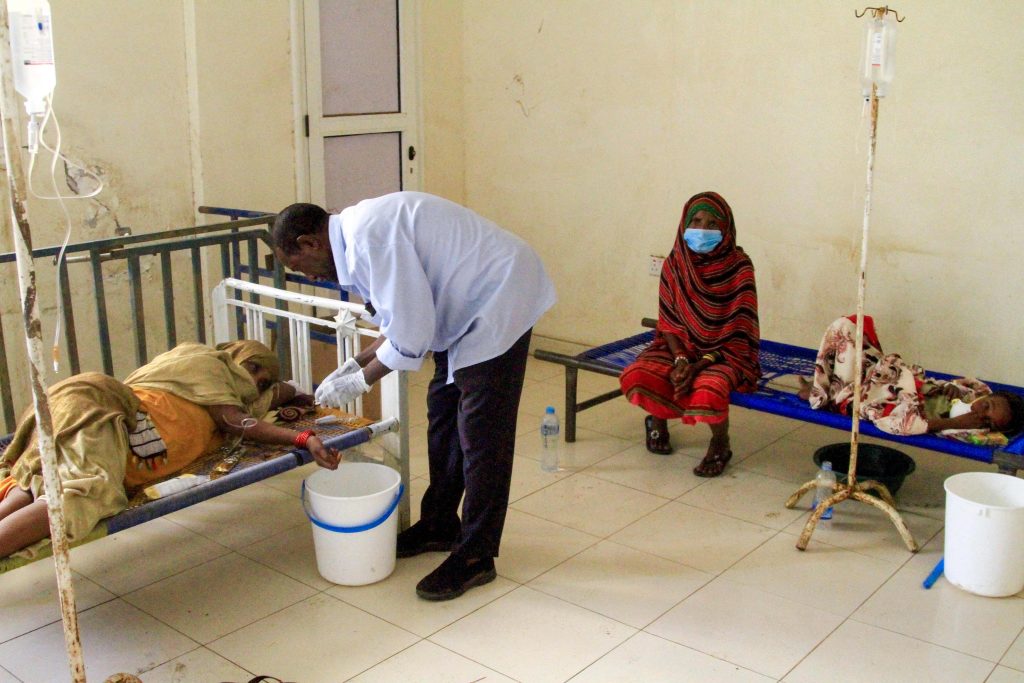Egypt declared malaria-free after 100-year effort
3 min read
Patients suffering from cholera receive treatment at a rural isolation centre in Wad Al-Hilu in Kassala state in eastern Sudan, on August 17, 2024. (Photo by AFP)

Patients suffering from cholera receive treatment at a rural isolation centre in Wad Al-Hilu in Kassala state in eastern Sudan, on August 17, 2024. (Photo by AFP)
Egypt has officially been certified as malaria-free by the World Health Organization (WHO), marking a significant milestone in public health that is being celebrated as “truly historic.” WHO chief Tedros Adhanom Ghebreyesus remarked on the occasion, stating, “Malaria is as old as Egyptian civilization itself, but the disease that plagued pharaohs now belongs to its history.”
The journey to this achievement spans nearly a century, with Egyptian authorities launching their initial efforts to combat the mosquito-borne disease almost 100 years ago. Malaria, which continues to kill over 600,000 people annually—primarily in Africa—has been a persistent threat, making this certification particularly meaningful.
The WHO awards this status to countries that demonstrate an interruption of malaria transmission for at least three consecutive years. In a statement released on Sunday, the WHO commended “the Egyptian government and people” for their relentless efforts to eradicate a disease that has been a part of the country’s history since ancient times. With this certification, Egypt joins the ranks of only 44 countries and one territory worldwide that have achieved this significant public health milestone.
Egypt becomes the third nation in the WHO’s Eastern Mediterranean Region to receive this certification, following the United Arab Emirates and Morocco. However, the WHO emphasized that this achievement should not be seen as the end of efforts against malaria but rather as the beginning of a new phase. The organization urged Egypt to remain vigilant in maintaining its malaria-free status.
To qualify for certification, a country must demonstrate not only the absence of malaria transmission but also the capability to prevent its re-establishment. The WHO noted that Egypt’s initial efforts to reduce human-mosquito contact date back to the 1920s, when authorities banned rice cultivation and restricted agricultural activities near residential areas.
Malaria is caused by a complex parasite that is transmitted through mosquito bites, and while vaccines are now available in some regions, monitoring and preventing mosquito bites remain the most effective strategies for avoiding the disease. The WHO’s recognition of Egypt’s achievement underscores the importance of sustained public health initiatives and community engagement in combating infectious diseases.
Egypt’s path to eradicating malaria has involved a combination of strategic interventions, including widespread public health campaigns, improved access to healthcare, and ongoing monitoring of mosquito populations. These initiatives have played a crucial role in interrupting the transmission cycle of malaria in the country.
As Egypt celebrates this significant public health victory, the WHO’s message serves as a reminder that maintaining this status requires continued effort and vigilance. The nation must strengthen its surveillance systems and health infrastructure to respond swiftly to any potential resurgence of malaria.
With malaria being a disease that has affected countless generations, this certification not only represents a triumph for Egypt but also serves as an inspiring example for other countries battling similar challenges. The achievement highlights the potential for success in global health initiatives when communities, governments, and international organizations collaborate effectively.
In conclusion, Egypt’s declaration as malaria-free is a monumental step in public health, signaling the end of a historical battle against a disease that has shaped the lives of many. However, as the WHO cautions, the real challenge now lies in sustaining this hard-won status and ensuring that the threat of malaria remains a thing of the past. The global health community will undoubtedly be watching closely as Egypt embarks on this new chapter in its health journey.